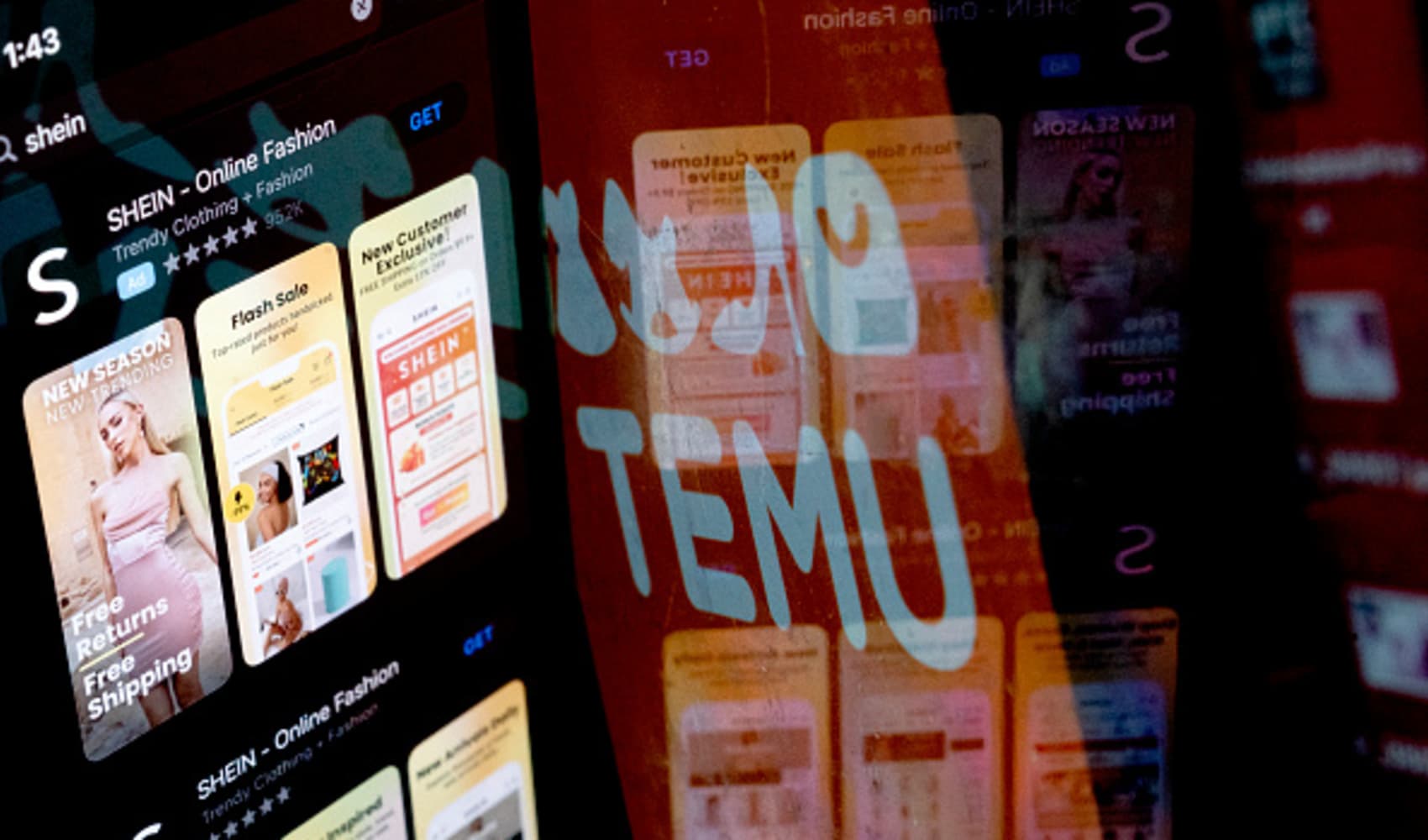Temu & Shein Tariffs: Will They Survive in the US?
Temu & Shein Tariff Tsunami: Can They Survive the US E-Commerce Storm?
Introduction: The Price of Fast Fashion Just Got Higher
Hold on to your hats, folks, because the world of online shopping is about to get a shakeup! The landscape for ultra-fast fashion giants Temu and Shein in the United States is undergoing a dramatic transformation. For a while, they enjoyed a sweet deal – a loophole that allowed them to ship those super-affordable clothes and gadgets into the country without hefty taxes. But that party’s over. So, the big question is: are these e-commerce titans doomed, or can they weather this tariff storm?
On Friday, the de minimis rule — a policy that had exempted U.S. imports worth $800 from trade tariffs — officially closed for shipments from China. This has seen Temu and Shein exposed to duties as high as 120% or a flat fee of $100, set to rise to $200 in June. This change threatens to significantly impact their business models, but experts are not ready to write them off just yet.
A Major Shake-Up: The De Minimis Loophole Closes
Understanding the De Minimis Rule
Let’s break this down. The "de minimis" rule was a policy that allowed goods valued under a certain amount (in this case, $800) to enter the US without being subject to tariffs or duties. Think of it like this: it was a free pass for small packages. This rule has been a cornerstone of Temu and Shein's strategy, allowing them to offer incredibly low prices.
Why the Closure Matters
So, why did this change happen? Well, there are a few reasons. Concerns about unfair competition, national security risks, and human rights issues have put a spotlight on these companies. The closure of the de minimis loophole aims to level the playing field and address these concerns.
The Tariff Tightrope: Navigating New Costs
How High Will Tariffs Go?
Here's the kicker: the end of the de minimis rule means Temu and Shein are now facing significant tariffs. Depending on the specific goods, they could be looking at duties as high as 120%. Imagine that! Suddenly, that $10 dress could cost a whole lot more.
The Impact on Pricing
Naturally, this will have a ripple effect on pricing. Will Temu and Shein absorb these costs and eat into their profits? Or will they pass them on to consumers, potentially making their products less attractive? It’s a delicate balancing act.
Don't Count Them Out: Experts Weigh In
Despite the challenges, industry experts aren't predicting the demise of Temu and Shein. Deborah Weinswig, CEO and founder of Coresight Research, stated "don't count them out... Not at all," suggesting that the apps are still capable of competing in the U.S. market.
The Power of Brand Recognition
Remember, Temu and Shein have built up significant brand recognition. They've tapped into a massive market of price-conscious consumers, and that's not something that disappears overnight. Think of them as the fast-food chains of fashion – even if their prices go up a bit, people still crave their convenience and affordability.
Customer Loyalty and the Habit Loop
Another thing working in their favor? Customer loyalty. They've successfully created a "habit loop" – users are drawn back to their apps for the thrill of discovering new deals and the dopamine rush of instant gratification. Breaking that habit won't be easy, even with higher prices.
Strategies for Survival: Adapting to the New Landscape
Diversifying Sourcing and Manufacturing
One strategy Temu and Shein are likely to employ is diversifying their sourcing and manufacturing bases. By moving production out of China to countries with favorable trade agreements with the US, they can potentially sidestep some of the tariffs.
Building US-Based Warehouses and Distribution Centers
Another move they could make is investing in US-based warehouses and distribution centers. This would allow them to reduce shipping costs and delivery times, making their products more competitive with domestic retailers.
Refining Pricing Strategies
Pricing will be key. They might explore offering bundled deals, loyalty programs, or flash sales to offset the impact of tariffs and maintain their competitive edge. Think of it as a game of retail chess – they need to be strategic and innovative.
The Rise of Alternatives: Will Competitors Benefit?
The Amazon Effect
The tariff situation could open the door for competitors, particularly Amazon. With its established infrastructure and massive reach, Amazon could capitalize on any potential decline in Temu and Shein's market share.
Other Fast Fashion Brands
Other fast fashion brands, both online and brick-and-mortar, could also see a boost. Companies that prioritize sustainability and ethical sourcing might also attract consumers who are becoming increasingly aware of the environmental and social impact of fast fashion.
A Changing Consumer Landscape: Shifting Values
The Growing Demand for Sustainability
Speaking of sustainability, there's a growing trend towards conscious consumerism. More and more people are questioning the ethics of fast fashion and seeking out brands that are committed to sustainability and fair labor practices.
The Appeal of Secondhand Shopping
The rise of secondhand shopping is another factor to consider. Platforms like ThredUp and Poshmark are making it easier and more convenient for consumers to buy and sell used clothing, offering a more sustainable and affordable alternative to fast fashion.
The Data Dilemma: Privacy Concerns and Security Risks
The Question of Data Security
Beyond tariffs, Temu and Shein have also faced scrutiny over their data privacy practices. Concerns have been raised about the amount of data they collect from users and how that data is used.
Addressing Public Concerns
To maintain consumer trust, these companies need to be transparent about their data practices and take steps to protect user privacy. Failing to do so could further erode their reputation and drive customers away.
The Long Game: A Pivotal Moment for E-Commerce
The Future of Ultra-Fast Fashion
So, what does all of this mean for the future of ultra-fast fashion in the US? It's clear that Temu and Shein are facing significant challenges, but they also have the resources and the brand recognition to adapt and survive.
A Catalyst for Change
This tariff situation could be a catalyst for positive change in the industry. It could push companies to prioritize sustainability, improve labor practices, and be more transparent about their data privacy policies. In the end, that would be a win for consumers and the planet.
Conclusion: Navigating the New Normal
The tariff tidal wave hitting Temu and Shein will undoubtedly reshape their presence in the US e-commerce scene. While the de minimis loophole closure and subsequent tariffs pose significant hurdles, their established brand recognition, loyal customer base, and potential strategic adaptations suggest they won't disappear entirely. Whether they can maintain their dominance hinges on their ability to innovate, address consumer concerns, and navigate the evolving landscape of online retail. It's a high-stakes game, and only time will tell who emerges victorious.
Frequently Asked Questions
- What is the de minimis rule and why is it important for Temu and Shein?
The de minimis rule allowed goods valued under $800 to enter the US without tariffs. It was crucial for Temu and Shein because it kept their prices low and competitive.
- How will the closure of the de minimis rule affect consumers?
Consumers may see higher prices on Temu and Shein products, as the companies may pass on the cost of tariffs. This could potentially decrease their affordability and appeal.
- What strategies can Temu and Shein use to mitigate the impact of the tariffs?
They can diversify their sourcing, build US-based warehouses, refine pricing strategies, offer bundled deals, and improve their customer loyalty programs.
- Are there any benefits to the closure of the de minimis rule?
Yes, it can level the playing field for domestic retailers, address concerns about unfair competition, and potentially encourage more sustainable and ethical sourcing practices.
- What are the main concerns about Temu and Shein besides tariffs?
Concerns include data privacy, labor practices, environmental impact, and the potential for selling counterfeit or unsafe products.

